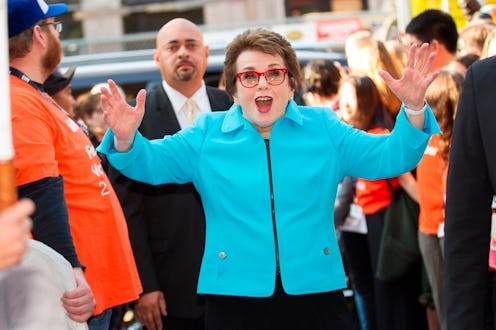
If you haven't seen Billie Jean King in a while, you're definitely not looking hard enough. The former champion tennis player isn't just the inspiration of the new film Battle of the Sexes, she's also a prominent LGBTQ and women's rights activist. King may have reached international fame as a professional tennis player in the '60s and '70s, but where Billie Jean King is now has allowed the athlete's legacy to move well beyond the tennis court.
King's professional tennis career has earned her 39 Grand Slam titles, including multiple wins at Wimbledon and the U.S. Open. She was ranked number one in the world in 1966, a title she held onto until 1968 and then earned back in 1971-1972 and 1974, and played in both singles and doubles competitions. And yet, there is a whole generation out there who knows King more as an activist than as an athlete. Since retiring from professional tennis in 1990, King has remained an active presence in the tennis world as a coach, mentor, and an activist. In 2009, she was awarded the Presidential Medal of Freedom by President Barack Obama for her work as an activist, not a tennis player.
"We honor what she calls 'off-the-court-stuff," President Obama said at the ceremony, via The Washington Post. "What she did to broaden the reach of the game, to change how women athletes and women everywhere view themselves, and to give everyone, regardless of gender or sexual orientation... a chance to compete both on the court and in life."
Today, King is known as a public champion for LGBTQ rights and a pioneer for gay athletes. In 2013, she traveled to the Sochi Olympics as a member of the official U.S. delegation in the closing ceremony, an appointment widely regarded as a public stand against Russia's anti-gay laws and practices. She is also a staunch supporter of women's rights who campaigned for Hillary Clinton in the 2016 presidential election. But to understand how King became the activist she is now, it's important to acknowledge that activism has always been a part of King's life, even as a young tennis player.
In the late '60s, after having won her first two Wimbledon championships (in 1966 and 1967), King became the voice of the movement fighting for women's equality in the sport. She advocated for equal prize money among men and women's games, and in 1973 King founded the Women's Tennis Association, which continued her fight for equality. And then, of course, there was the Battle of the Sexes, the major tennis event that provided the main inspiration for the film of the same name. In 1973, King, then 29, accepted a challenge from former number one men's player Bobby Riggs, then 55. Riggs, known by then as a showman and a hustler, set up the match as a true battle of the sexes to see if a woman could really beat a male player on the court. Spoiler alert: she could and she did.
Already a famous figure in the fight for women's rights, King's path shifted in 1981 when she was outed as gay by her ex, Marilyn Barnett, when she sued her for palimony. "It was terrible. I lost all my money overnight, paying lawyers" King told The New York Times of the experience in 2014. "All my endorsements were yanked." But King's career wasn't the only thing put in jeopardy by her outing. After years of activism, King was worried that the scandal of her personal life would be used to dismiss her fight for equal rights. "And I was really worried about women's professional tennis, which was just starting, and our fight for equality with men — for equal pay. I was paralyzed." In the end, it opened up a brand new avenue of activism for King: gay rights.
Today, when she's not busy advocating for women's rights of LGBTQ rights, King is spending time with her partner of 30 years, Ilana Kloss, and catching a tennis match every now and then. That said, the icon is still hungry to do more. "I'm never satisfied," she told CBS News when asked about her long list of accomplishments. "No, I want to keep going as long as I can. Every human being matters." King clearly has no plans of slowing down, so odds are you'll be seeing her around well beyond the Battle of the Sexes press tour.